Joint MARVEL-QSE seminar: Andrew Briggs
Practical details:
- In-person participation: room MED 2 1124 (Coviz2), EPFL
- Remote participation: Zoom link

Accelerating Quantum Technologies with Machine Learning
Andrew Briggs, University of Oxford
A basic challenge in quantum computing is to tune and characterise qubits on an ever-expanding scale [1]. We have developed machine learning methods for quantum technologies, which are able to learn how to do this more efficiently than even experienced humans [2]. This requires moving beyond methods which demand large amounts of readily available data, because in quantum technologies the data are often sparse and costly to acquire.
The machine learning is required not simply to classify the measurements which have been taken but to decide what parameters to set next [3]. Without being reprogrammed, the machine is able to learn how to tune different architectures [4], and to characterise the variability of nominally identical devices [5].
To meet the commercial need for the techniques developed in our laboratory, we founded a new company [6]. The product will be launched at the end of August.
As scientists we have the responsibility and the privilege of advocating the responsible use of the progress to which we contribute. This calls for insight from science and wisdom from other disciplines to learn how together we can seek to promote human flourishing in times which seem to be increasingly subject to uncertainty [7].
[1] Efficiently measuring a quantum device using machine learning. npj Quantum Information 5, 79 (2019)
[2] Machine learning enables completely automatic tuning of a quantum device faster than human experts. Nat. Commun. 11, 4161 (2020)
[3] Quantum device fine-tuning using unsupervised embedding learning. New J. Phys. 22, 095003 (2020)
[4] Cross-architecture tuning of silicon and SiGe-based quantum devices using machine learning. arXiv:2107.12975
[5] Bridging the reality gap in quantum devices with physics-aware machine learning. arXiv:2111.11285
[6] https://quantrolox.com/
[7] Human Flourishing: Scientific insight and spiritual wisdom in uncertain times. Oxford University Press (2021)
About the speaker
Andrew Briggs is Professor Emeritus of Nanomaterials at the University of Oxford and Executive Chairman of QuantrolOx. His research interests focus on nanomaterials for quantum technologies and their incorporation into practical devices, and the nanoscale thermodynamics of timekeeping and learning. From 2002-2009, he directed the UK Interdisciplinary Research Collaboration in Quantum Information Processing. In 2021 he co-founded QuantrolOx to commercialise machine learning for tuning and characterizing quantum devices, with performance that greatly exceeds what is feasible for humans.
He is a Fellow of St Anne’s College, Oxford, Fellow of Wolfson College, Oxford, Honorary Fellow of the Royal Microscopical Society, Fellow of the Institute of Physics, Fellow of the Cambridge Philosophical Society, Fellow of the International Society for Science and Religion, and Member of Academia Europaea. He has over 650 publications, with nearly 30,000 citations.
His books for a general readership include “The Penultimate Curiosity: How Science Swims in the Slipstream of Ultimate Questions”, for which there is a documentary film and a six-book series for children; “It Keeps Me Seeking: The Invitation from Science, Philosophy and Religion”; and “Human Flourishing: Scientific Insight and Spiritual Wisdom in Uncertain Times”. His most recent book carries endorsements by the Archbishop of Canterbury and the Astronomer Royal.
Low-volume newsletters, targeted to the scientific and industrial communities.
Subscribe to our newsletter